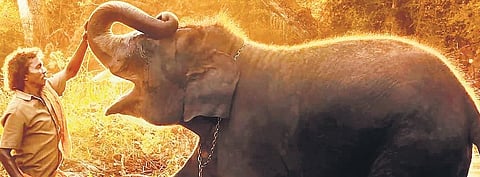

Earlier this year, when The Elephant Whisperers bagged the Academy Award for Best Documentary Short Film, it created history. Released late last year, it explored the lives of two mahout couples entrusted with the task of taking care of an orphaned baby elephant. It won many hearts across the world – enough to become the first Indian film to win an Oscar.But earlier this month, the film directed by Kartiki Gonsalves, was once again put into the spotlight when the couple, Bellie and Bomman, accused the filmmakers of not compensating them the promised sum for the film during a viral interview.
While the filmmakers have refuted the accusations, with even the couple taking back their claims recently, the episode still raises the question of ethical responsibilities a filmmaker has to adhere to while taking on subjects like these. “If the allegations are true, it’s really bad. When you film people who have little-to-no understanding of the outside world, you should show gratitude. Once they won the Oscars, the filmmakers should have celebrated the win together with the subjects. Unfortunately, I’ve heard numerous bitter stories of filmmakers not fulfilling their commitments,” says Sandalwood filmmaker Nagathihalli Chandrashekar.
But for author, filmmaker and thespian Kirtana Kumar, the issue is one that is much more complex than it seems on the surface. “India has one of the strongest documentary scenes in the world. The process of documenting the lives of the undocumented is an arduous task. I don’t think any documentary filmmaker does it to get rich or for awards. They do it because they wish to draw attention to certain social issues,” she says, adding, “I find it hard to believe that the filmmakers didn’t compensate the subjects. Usually, they have to get an agreement of sorts before they start filming. At the same time, when a film gets as wide a reach as this one did, the subjects of the film have the right to ask for a share of the proceeds it generated.”
Director KM Chaitanya believes that films such as The Elephant Whisperers tend to have a negative impact on the lives of its subjects in the long run, and often leave them exposed to exploitation from others. “It’s a peculiar job for the filmmaker. On the one hand, you’re getting recognition for these people who previously had nobody looking at them. They would have been in their world, with no attention from the outside world. And then this film enters their life and brings attention with it. But that attention is only momentary. It doesn’t last long. For instance, a group of underprivileged kids who acted in Salaam Bombay! got international attention overnight. Similar was the case with the Kannada film Thithi, which projected a group of simple villagers into the limelight. They were in the spotlight for a few years and slowly disappeared. Neither were ready for the limelight,” he explains.
Chaitanya suggests that filmmakers should be careful not to treat their subjects as mere sources of information, but also carefully consider the long-term consequences and fallout that the limelight might bring to their lives.
Meanwhile, filmmaker Kavitha Lankesh believes that in this case, the filmmakers may also consider providing additional financial support to the couple, given the film’s immense success, and points out the lack of a legal framework that could prevent exploitation. “Filmmakers have a responsibility to fairly compensate their subjects. It would also be better if they give the couple some more money and support to make their lives comfortable. These days, you see a lot of stars in Bollywood and a few South film industries getting a share of the profits from their films. But you don’t see that same profit being distributed among the hundreds of technicians and artistes who worked on the film. We have no regulations to prevent exploitation,” she adds.